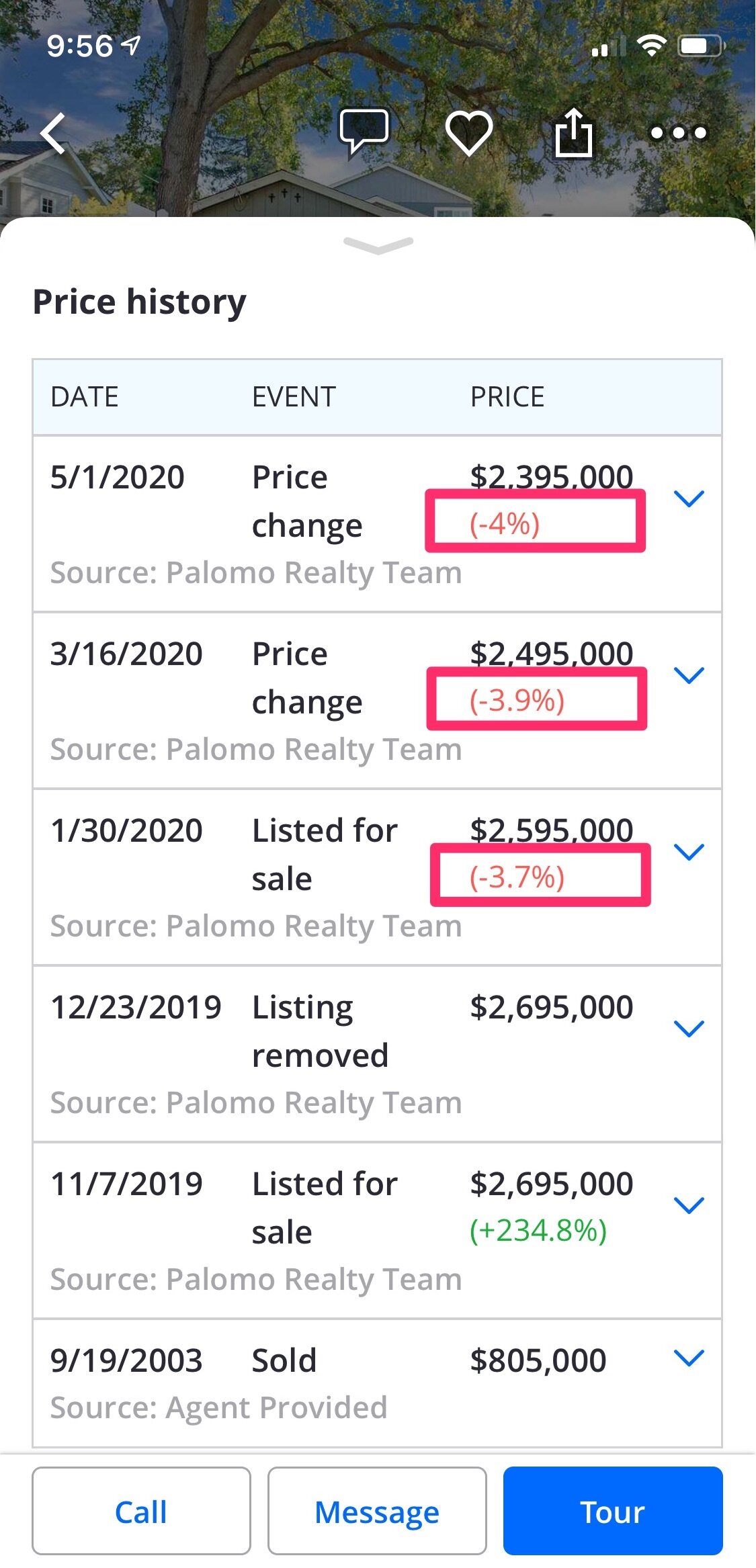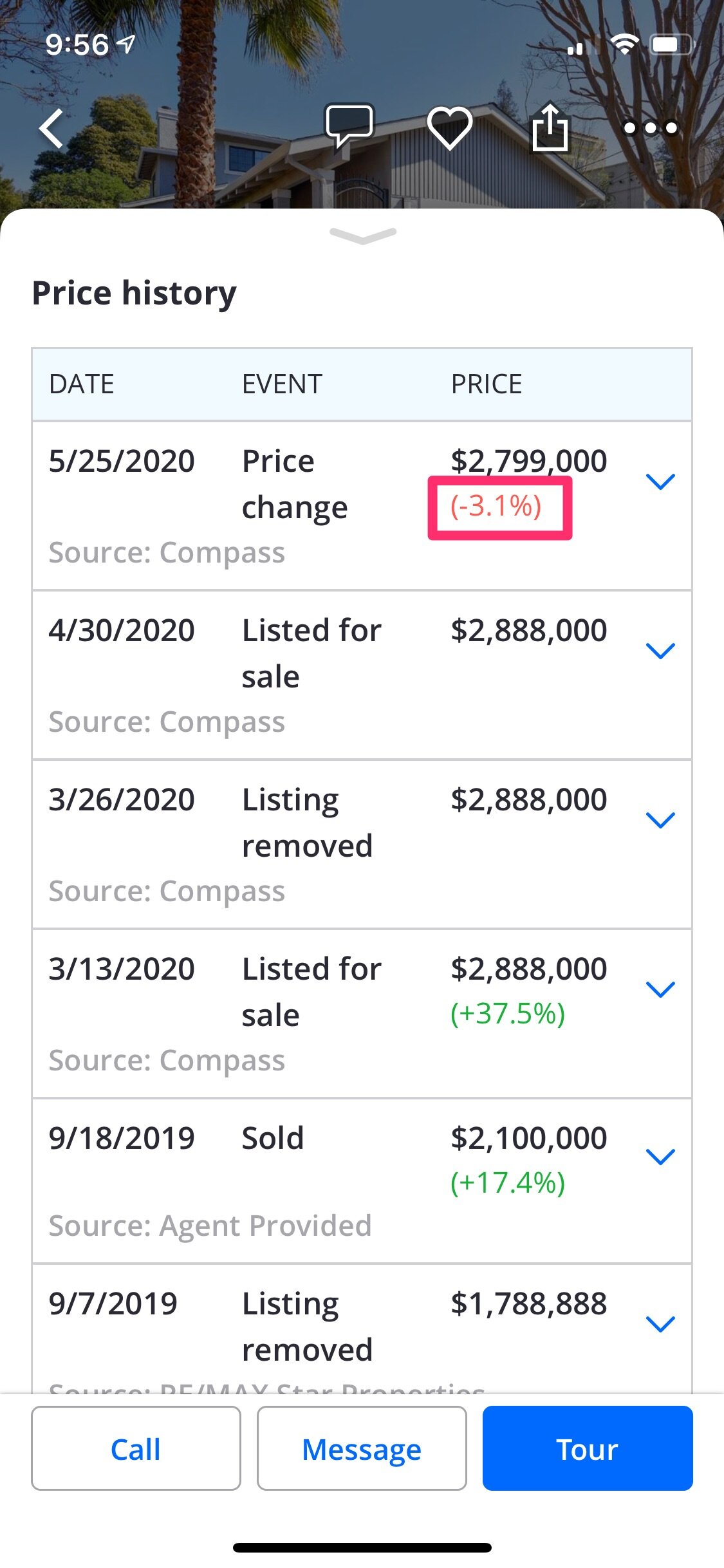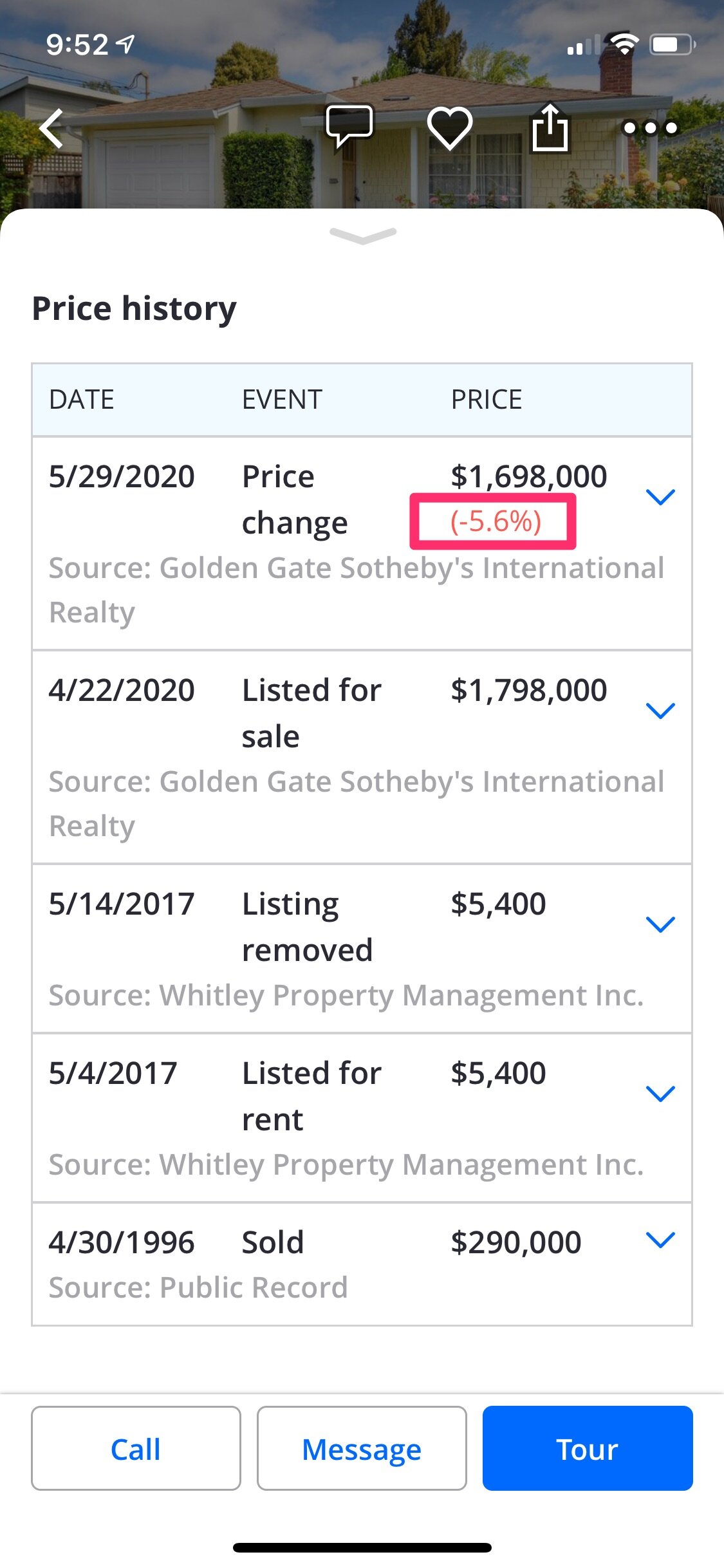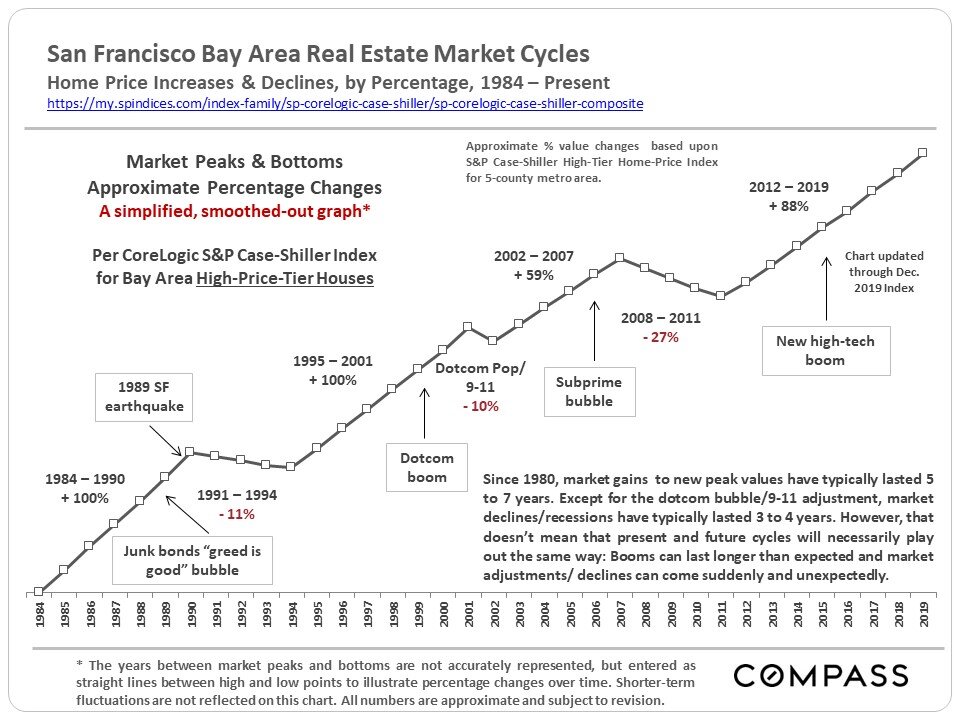TLDR
If you are seriously considering buying a home in the Bay Area, now might be a good time to do it. Social distancing has made dense urban centers temporarily less desirable, rents are falling rapidly, banks have become more cautious about lending to potential buyers, and many people remain uncertain about the future. All of these effects are outweighing historically low mortgage interest rates, low inventory, and (up until recently) white-hot demand. Although the observed price drop is still fairly muted, it is likely to be significant for most home buyers and could become even more significant if any number of developments occur in the next 6-12 months. It’s impossible to precisely time any market, but there are deals to be had right now.
Why You Should Trust Me
Housing has been a long time interest of mine. When shelter in place started in the bay, I started doubling down on my research and have now spent more than 40 hours reading articles on the subject, talking with my local realtor, and collecting anecdotal data from my peer group for my own Biege Book.
Social Distancing Destroys Most of the Value of Living in a City
San Francisco is the second most expensive city in the US. [1] With the median rent for a 1 bedroom apartment hovering around $3,400 [2], many people have found it difficult to justify living in the city. And if you look around the bay area, you’ll find that SF isn’t even the most expensive town to live in [3]: places on the Peninsula like Cupertino and Menlo park are even more expensive. So, why live here? For most people it’s primarily about the jobs [4] [5] [6], but it’s also about the culture, the nightlife, and the proximity to natural wonders. With recent layoffs [7] [8] and shelter in place orders closing everything from restaurants, to clubs, to national parks, a lot of those benefits have simply evaporated. It’s hard to justify spending $3,400 to live, and work 24/7 in a tiny apartment.
Coronavirus seems unlikely to fundamentally reorganize the world 5 or 10 years from now, but many people I’ve spoken to don’t see things fully returning to normal in the near future. Bill Gates says the only way for the world to “return to normal” is for there us to create and distribute a covid-19 vaccine [9], but according to the Guardian, even if a vaccine does become available for covid-19, only 50% of Americans say that would consider getting it [10]. For many people, there isn’t a light at the end of this tunnel, and for those with family and friends that live elsewhere, or families with children, or just people who really liked going to concerts, it’s a lot harder to justify paying to live in the Bay Area while we wait.
Rents Are Falling Rapidly
Falling rents put pressure on home prices. As of June, 2020, rents in SF have fallen ~9% year on year [11]:
Home prices and rents are related because they address similar human needs: shelter. Most renters are probably not looking to purchase and vice versa, so you wouldn’t expect big changes in rental prices to have a big impact on home prices, but it’s easy to understand why less costly rent might cause a current tenant to forego a home search in favor of a “wait and see” approach. In 2019, only 52% of Bay Area residents owned their home, many of whom make more than $150,000 per year [12]. There are a lot of renters in the Bay and market forces could lower their housing costs.
Note too that renting is already more affordable month-to-month than home ownership in the bay [13]. Each individual town is a bit different, but here in my town on the peninsula, it costs about 2x as much per month to own the same property as it does to rent it. If rents continue to drop, the gap between the cost of home ownership and the cost of renting will widen, drive potential buyers out of the market, and eventually lower home prices. The US housing supply has become increasingly inelastic since 2008 and the Bay Area is an exemplar of that trend [14]. When supply is inelastic, small drops in demand cause large drops in prices and home prices have not adjusted sufficiently to avoid falling rents to suppress demand further.
It’s Harder to Get a Home Mortgage
Jumbo loans are mortgage loans that exceed the “conforming limit” set by Fannie Mae and Freddie Mac. Here in the bay area, that limit is $765,600. With a standard 20% down payment, that limit means that any home that costs more than $957,000 requires a jumbo loan. Right now, every city in my home county of San Mateo has median property values that exceed that limit [15]:
That means that unless you have substantially more than 20% of the home value for the down payment, you will need a jumbo loan. And that’s a bit of a problem at the moment. According to Bankrate, mortgage loan availability in April dropped to the lowest level since 2014 [16]. With the unemployment rate at its highest level since the second world war, banks aren’t taking risks on people with less-than-perfect credit.
If you have great credit and the necessary down payment (I’m hearing 720+ credit score and at least 25% down are necessary to close), the coronavirus has reduced the number of competing bidders for any given property. This reduction in potential buyers leads to opportunity for buyers who do meet the above criteria.
People Are Uncertain about the Future
Most long term impacts of coronavirus are still unknown. With big tech companies like Facebook and Twitter permitting at least part of their employees to work from home indefinitely [17], and some smaller companies starting to follow suit, people are wondering: is the Bay Area still worth it [18]? People have been predicting the end of Silicon Valley for decades [19], but past false positives are not conclusive proof that this isn’t the start of something new. Home values really could start slipping in the coming years as people gradually decide that trading some career growth to live closer to family, live in a bigger home, or just deal with less traffic on a daily basis is a worthwhile trade.
Similarly, the economic impacts of Coronavirus are at best poorly understood. The national debt reached the highest levels ever recorded as a result of the coronavirus stimulus measures [20]. Delaying payments on everything from credit cards to mortgages is historically unprecedented for consumers, and nobody knows when employment will return to 2019 levels. Early indicators of consumer behavior from China suggest that things are unlikely to return completely to normal for quite a while [21] and it’s unclear what that means for jobs and spending.
All of this has led to understandable concern about what the world will look like in 6, 12, and 18 months. When there is uncertainty, however, there is also opportunity.
The Impact of These Trends on Prices
Prices for real estate in San Mateo county are down. Compass Realty is showing a 7.1% drop in prices, while the SF Chronicle suggests the effect is closer to 6.6% [22]:
Bidding activity is also weakening:
There are a lot of explanations for why this trend might be happening, but I think it’s because demand is drying up faster than the supply of homes being put on the market due to the trends mentioned above.
At a more concrete level, here is my neighborhood, I’m seeing homes be discounted around 4-6% on average. Here are a few examples of properties all within a mile of my home:
It seems safe to say there are deals out there. I’ve been seeing price drops around 5%, but remember that’s just the asking price. The bidding data above suggest that homes are closing for under asking for the first time in several years. With careful bargaining [23], I think it’s possible to do much better than a 5% discount.
If There are So Many Deals, Why Not Wait?
Residential real estate prices adjust more slowly than other assets and if the long-term trend is downward, you could imagine getting an even better deal in 6-12 months. I think this logic is probably flawed for two reasons:
You can’t time the market. As anyone who tried to time the stock market in March will tell you, every decline is different and it’s incredibly hard to be right both when you sell and buy. Plus, if you are buying a home purely as an investment, you’re overlooking far better vehicles to generate cash. A home is a form of shelter. Here in the Bay Area, it might also earn you some money, but it’s probably not a great idea to treat it like your stock portfolio. If you were already thinking about buying, you could easily save six figures by doing so now. Will you save every last cent you could have if you were capable of perfectly timing the market? No. But, if you wait too long, the price advantage may disappear completely.
The adjustment back to “normal” is likely to be faster than expected. Historically, pandemics do not inflict lasting damage on home prices. In fact, a recent historical analysis by Zillow [24] concluded that pandemics have a statistically insignificant impact on prices. Even much larger pandemics like the Spanish Flu in 1918 do not appear to have meaningfully impacted home prices. That suggests that what we’re seeing is likely to be short-lived as the economy gets back on its feet and things adjust towards a new normal that looks more like 2019.
Conclusion
Here’s a bit of historical context to put the current dip into perspective:
At -7%, Coronavirus has already been 63% as bad for housing prices as the 1989 Lomo Prieta earthquake, 70% as bad as the 2001 dot-com crash, and 26% as bad as the subprime crisis. It’s always possible that we’ll see an extended slide in prices as everyone starts working from home and Silicon Valley implodes. But millions of people chose to live as they did in 2019 for a reason. That consensus seems far more likely to prevail after the virus has passed. And when that normality returns, whatever specific form it takes, it seems likely there will still be too many jobs and too few houses in Silicon Valley.
Thanks to Ben, Nick, and Robert for reading over drafts of this and helping me to refine my thinking.
Sources
Coronavirus: Even Pandemic Can’t Slow Down Bay Area Home Prices (Mercury News, 5.6.20)
How Coronavirus is Impacting the Housing Market (Curbed, 4.23.20)
How a recession could impact the housing market (Curbed, 1.10.19)
Information From Past Pandemics, And What We Can Learn: A Literature Review (Zillow, 3.13.20)
Here’s where coronavirus will impact the housing market the most (Curbed 4.7.20)
Survival of the Fittest: The Real Estate Pandemic Survival Guide (Mike Delprete, 3.21.20)
Coronavirus is brewing a mortgage crisis (Curbed 4.8.20)
These markets could see the sharpest drop in home prices during coronavirus pandemic (CNBC 4.20.20)
On the dynamics of the primary housing market and the forecasting of house prices (2015)
Real Estate Buying Strategies During The COVID-19 Pandemic (Financial Samurai, 4.18.20)
California housing market feels full brunt of coronavirus outbreak in April, C.A.R. reports (PR Newswire 5.18.20)
How Does Price Elasticity Affect the Housing Industry? (The Nest, 2.12.19)
The declining elasticity of US housing supply (Vox, 2.25.20)
Tech companies’ work from home policies have some workers ready to flee Silicon Valley (The Verge, 5.15.20)
The Technology 202: The tech industry's shift to remote work will forever change Silicon Valley (Washington Post, 5.22.20)
Tech Workers Consider Escaping Silicon Valley’s Sky-High Rents (Bloomberg, 5.14.20)
Op-ed: The next Silicon Valley exodus — Over 25% of tech sector wants permanent work from home (CNBC, 5.19.20)
Walmart says its thousands of tech employees will continue remote work — even when pandemic subsides (5.28.20)
Tech jobs soar to all-time record in Bay Area (Mercury News, 7.5.19)
Size Ensures Success for 15 of the Largest Tech Companies in Silicon Valley (BuiltinSF, 2.5.2020)
Bay Area Housing Post-Pandemic: What’s in Store? (KQED, 5.14.20)
Reports detail Silicon Valley’s housing crisis pre-coronavirus (San Jose Spotlight, 5.13.20)
California Housing Market Report & Predictions 2020 (ManageCasa, 5.25.20)
Coronavirus: Home sales, prices expected to dip, recover slowly (Mercury News, 5.5.20)
2019 San Mateo Single Family Sales
Largest-technology-employers-in-Silicon-Valley
Infographic: San Mateo County Home Sales | 2019 Annual (San Mateo County Association of Realtors, 1.4.20)
San Francisco housing indicators (First Tuesday Journal, 5.26.20)
Alameda County Real Estate: Coronavirus Update (Compass Realty, 5.2020)
San Mateo County Real Estate: June 2020 Report (Compass Realty, 5.2020)
Remote Work Could Spark Housing Boom in Suburbs, Smaller Cities (WSJ, 5.30.20)
Buying A New Home: Wait Or Do It Now? (Forbes, 5/2020)
Millions Of Americans Skip Payments As Tidal Wave Of Defaults And Evictions Looms (NPR, 6.3.20)
SF, Silicon Valley rents plunge amid downturn: 'Never seen anything like it' (SF Chronicle, 6.1.20)
The Supply of Housing Has Become LESS Elastic (Marginal Revolution, 8.15.19)
Housing Costs Reduce the Return to Education (Marginal Revolution, 7.23.18)
Was there a Housing Price Bubble? Revisited (Marginal Revolution, 8.3.17)
S.F. sees ‘unprecedented’ drop in rent prices (Curbed, 6.2.20)
Zumper National Rent Report: June 2020 (Zumper, 6.1.20)
Is 2020 A Good Time To Buy San Francisco Bay Area Real Estate? (Financial Samurai, 5.2.20)
Longer-Run Economic Consequences of Pandemics (Federal Reserve Bank of San Francisco, 3.2020)
It could take two years for the economy to recover from the coronavirus pandemic (The Conversation, 5.30.20)
CBO’s Current Projections of Output, Employment, and Interest Rates and a Preliminary Look at Federal Deficits for 2020 and 2021 (CBO, 5.24.20)
The 15 Most Expensive Cities In The US And What They Really Cost (QuickenLoans, 9.20.19)
SF does not have the highest rents in the Bay Area (Curbed, 7.17.19)
The Top Reasons To Live And Work In San Francisco (Financial Samurai, 5.2020)
6 Top Cities for High-Paying Jobs (Monster.com, ???)
The 10 Best Cities for Jobs (US News and World Report, 5.19.2019)
Best Cities for Jobs (WalletHub, 1.3.2020)
Coronavirus Layoffs Remake Silicon Valley Job Market (WSJ, 5.20.20)
Layoffs (Techcrunch)
Just half of Americans plan on getting Covid-19 vaccine, poll shows (The Guardian, 5.27.20)
2 out of 3 tech workers would leave SF permanently if they could work remotely (SF Gate, 5.22.2020)
Bay Area homeownership hits seven-year low. Are out-of-control prices to blame? (The Mercury News, 7.25.19)
Should you buy a home in SF in 2020? (Curbed, 3.11.2020)
Low mortgage rates increasingly inaccessible for poor credit score borrowers (Bankrate, 5.27.2020)
Remote Work Isn’t the End of Silicon Valley, but It Is the End of Something (OneZero, 5.23.2020)
Once we can work from anywhere, does the world need Silicon Valley? (Fast Company, 6.8.2020)
How Much is the National Debt? What are the different measures used? (Peter G Peterson Foundation, 6.5.2020)
The 90% economy that lockdowns will leave behind (The Economist, 4.30.2020)
Bill Gates: Until coronavirus vaccine, world won't be 'truly normal' (Fox News, 4.5.2020)
Price-to-Rent Ratio in the 50 Largest U.S. Cities – 2020 Edition (Smart Asset, 4.22.2020)
Bay Area home sales fall by half in May vs. last year; prices off 2.5% (SF Chronicle, 6.16.2020)
National and Local Housing Market Recovery Trends (Realtor.com, 6.11.2020)
CoreLogic Pending Index Indicates Annual Price Growth holding up surprisingly well in May (CoreLogic, 5.26.2020)







